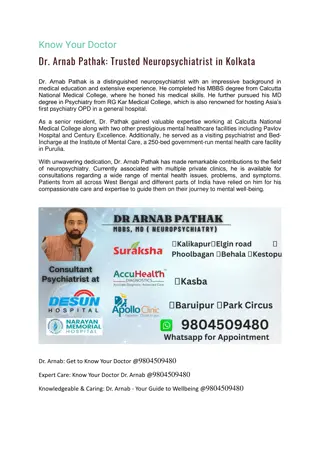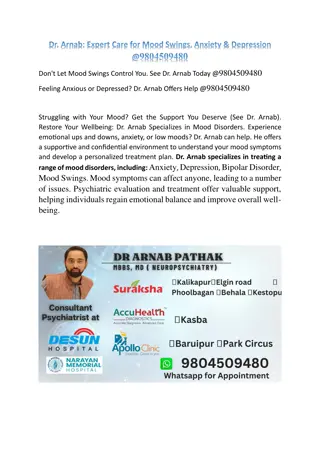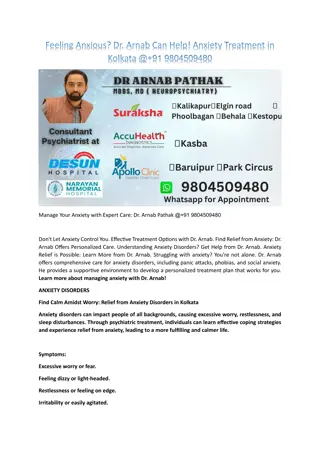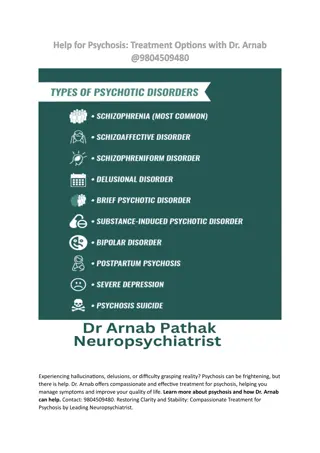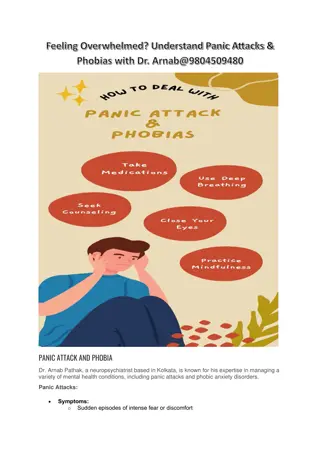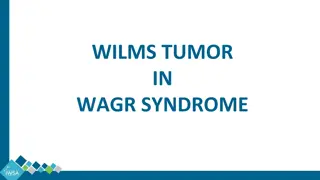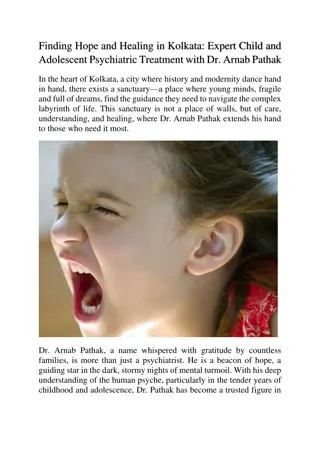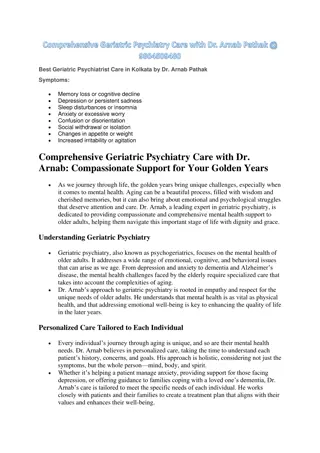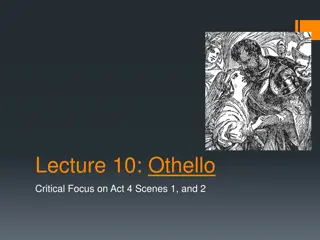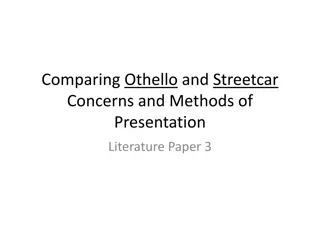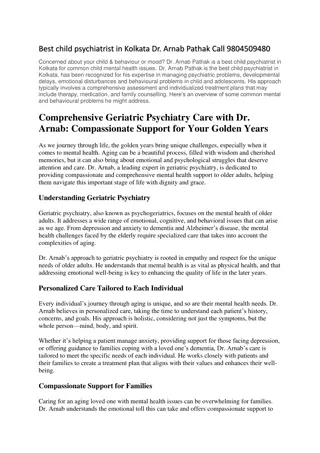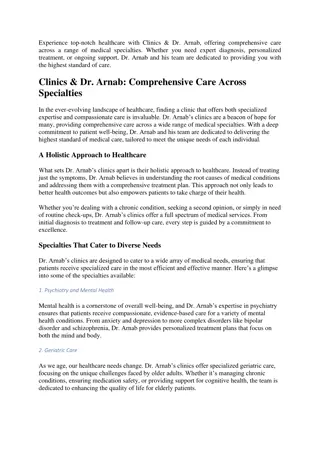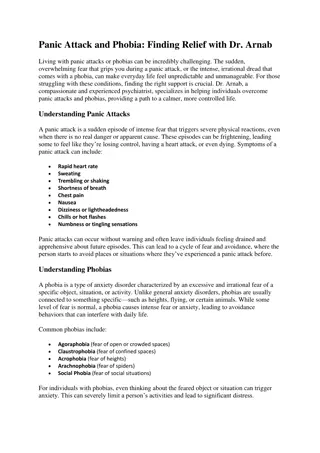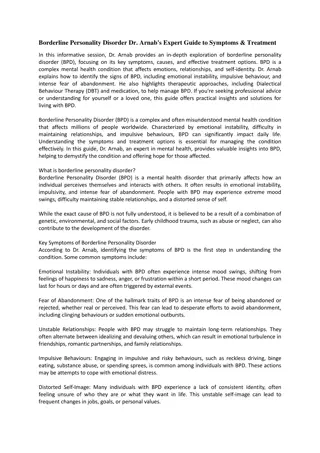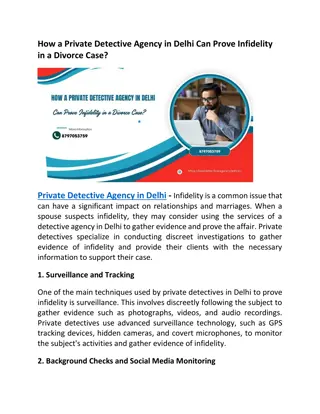
Delusion of Infidelity (Othello Syndrome) & Expert Care by Dr. Arnab
Explore the complexities of Delusion of Infidelity, also known as Othello Syndrome, and discover expert care with Dr. Arnab Pathak. With compassionate treatment and deep expertise, Dr. Arnab helps patients and their families navigate this challenging
Download Presentation

Please find below an Image/Link to download the presentation.
The content on the website is provided AS IS for your information and personal use only. It may not be sold, licensed, or shared on other websites without obtaining consent from the author. Download presentation by click this link. If you encounter any issues during the download, it is possible that the publisher has removed the file from their server.
E N D
Presentation Transcript
Explore the complexities of Delusion of Infidelity, also known as Othello Syndrome, and discover expert care with Dr. Arnab Pathak. With compassionate treatment and deep expertise, Dr. Arnab helps patients and their families navigate this challenging condition towards recovery and well-being. Understanding Delusion of Infidelity (Othello Syndrome) and Expert Care by Dr. Arnab Relationships are built on trust, love, and mutual respect. But what happens when these foundations are threatened by an irrational and overpowering belief that one s partner is being unfaithful? This distressing condition, known as Delusion of Infidelity or Othello Syndrome, can wreak havoc on individuals and relationships alike. For those grappling with this challenging disorder, expert care is essential, and that s where Dr. Arnab, a leading psychiatrist, steps in to provide compassionate and effective treatment. What is Delusion of Infidelity (Othello Syndrome)? Delusion of Infidelity, commonly referred to as Othello Syndrome, is a psychiatric condition characterized by an unshakable belief that one s partner is being unfaithful, despite a lack of evidence. Named after the character Othello from Shakespeare s famous play, who is consumed by irrational jealousy, this syndrome can lead to severe emotional distress, strained relationships, and even dangerous behaviors. Individuals with Othello Syndrome become obsessed with the idea that their partner is cheating on them. They may constantly accuse their partner, demand proof of fidelity, and engage in behaviors such as spying, checking messages, or interrogating friends and family. This delusional belief is resistant to logic and reassurance, making it incredibly challenging for both the affected individual and their partner. Symptoms of Othello Syndrome Othello Syndrome can manifest in various ways, but some common symptoms include: Persistent and irrational jealousy: The person is convinced that their partner is unfaithful, despite evidence to the contrary. Obsessive behaviors:Checking their partner s phone, emails, or social media accounts for signs of infidelity. Accusations and interrogations: Repeatedly questioning their partner or others about suspected infidelity. Emotional instability: Feelings of anger, sadness, anxiety, and frustration due to the belief of being betrayed. Social withdrawal:Isolating oneself or one s partner from social situations due to fear of infidelity. Aggressive behavior: In extreme cases, the delusion may lead to verbal or physical aggression. These symptoms can lead to significant distress and impairment in daily functioning, often causing the affected individual to experience depression, anxiety, and a profound sense of betrayal.
Causes of Othello Syndrome The exact cause of Othello Syndrome is not fully understood, but it is believed to be a complex interplay of psychological, neurological, and environmental factors. Some potential contributors include: Underlying mental health conditions: Othello Syndrome may be associated with other psychiatric disorders such as schizophrenia, obsessive-compulsive disorder (OCD), or paranoia. Neurological factors: Brain injuries, dementia, or other neurological conditions may trigger delusional thinking. Substance abuse: The use of alcohol or drugs can exacerbate feelings of jealousy and paranoia. Past experiences: Traumatic experiences or past relationships marred by infidelity can contribute to the development of Othello Syndrome. Personality traits: Individuals with certain personality traits, such as low self-esteem or a tendency toward suspiciousness, may be more vulnerable to developing delusional jealousy. The Impact of Othello Syndrome on Relationships Othello Syndrome can have a devastating impact on relationships. The constant accusations and obsessive behaviors create an atmosphere of mistrust and tension, making it difficult for the relationship to thrive. The partner of the affected individual may feel hurt, confused, or trapped in a cycle of reassurance and frustration. Over time, this can lead to emotional exhaustion, estrangement, and in some cases, the breakdown of the relationship. In more severe cases, the delusion may lead to dangerous behaviors, including violence, which underscores the importance of seeking professional help as soon as possible. Expert Care by Dr. Arnab For those struggling with Othello Syndrome, professional help is crucial to managing the condition and restoring harmony in their lives and relationships. Dr. Arnab, a highly respected psychiatrist with extensive experience in treating delusional disorders, offers compassionate and evidence-based care tailored to the unique needs of each patient. Dr. Arnab s Approach to Treating Othello Syndrome Dr. Arnab s treatment approach is holistic and patient-centered, focusing on both the psychological and relational aspects of Othello Syndrome. His care typically involves the following steps: Comprehensive Assessment: Dr. Arnab begins with a thorough assessment to understand the underlying causes and severity of the delusion. This includes exploring the patient s mental health history, current symptoms, and any contributing factors such as neurological issues or substance use. Personalized Treatment Plan: Based on the assessment, Dr. Arnab creates a tailored treatment plan that may include a combination of medication, psychotherapy, and
family counseling. The goal is to reduce delusional thinking, manage associated symptoms such as anxiety or depression, and improve overall functioning. Cognitive Behavioral Therapy (CBT): CBT is often a key component of treatment, helping patients challenge and change the irrational beliefs driving their delusional jealousy. Through CBT, patients learn to recognize and reframe their thoughts, reducing the intensity of their delusions over time. Medication Management: In some cases, medication may be prescribed to help manage symptoms of Othello Syndrome. Antipsychotics, antidepressants, or anti- anxiety medications can be effective in reducing delusional thinking and improving emotional stability. Couples Therapy: Given the significant impact of Othello Syndrome on relationships, couples therapy may be recommended. Dr. Arnab works with both partners to improve communication, rebuild trust, and develop strategies to cope with the challenges posed by the delusion. Ongoing Support and Monitoring: Recovery from Othello Syndrome requires time and ongoing support. Dr. Arnab provides regular follow-up sessions to monitor progress, adjust the treatment plan as needed, and ensure that patients and their families have the resources and support they need. Conclusion: Seeking Help for Othello Syndrome Living with Othello Syndrome can be incredibly challenging, but with the right care and support, individuals can manage their symptoms and rebuild their relationships. If you or someone you love is struggling with delusional jealousy, don t hesitate to seek professional help. Dr. Arnab s expertise in treating Othello Syndrome and his compassionate approach to care offer hope for those affected by this distressing condition. Take the first step towards healing and recovery contact Dr. Arnab today at [contact information] to schedule a consultation and begin the journey towards a healthier, more fulfilling life. Contact us today and step into the serene embrace of Dr. Arnab Pathak s care. 9804509480 Accuhealth diagnostic, sandhyadeep 16/A, Gold Park Road Rajdanga Kolkata, West Bengal 700107 India Mail: arnab.pathak@gmail.com https://drarnabpathak.in/delusion-of-infidelity-othello-syndrome/

